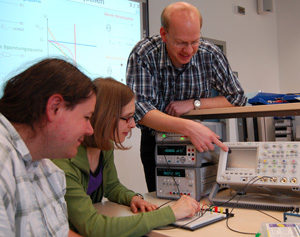Electronics Laboratory Course
 “How do I reduce noise in a measured data signal?”
“How do I reduce noise in a measured data signal?”
“How does a lock-in amplifier actually work?”
“Is the measured signal real or am I seeing an artefact?”
“Why is the sampling frequency important for data logging?”
“Why can I measure more precisely with a digital multimeter compared to using an oscilloscope?”
The answers to these questions are important to obtain optimal measurements in a physical experiment – and most importantly, to not chase after any measuring artefacts.
In the electronics lab course of the physics department, students learn the fundamental set of tools used in electronics and a variety of measurement techniques. This includes electronic circuits, different laboratory measurement instruments, the construction of a sensitive amplifier, analog-digital conversion and microcontroller programming. The courses ends with an introduction in to computer programs for data logging and the production of your own printed circuits. To this end, the electronics lab course offers high quality lab tools and exciting experiments, notably,
- ECG amplifiers
- Lock-in amplifiers
- Proportional-integral-derivative controller
- Microcontroller programming
- Nyquist-Shannon sampling theorem
Since 2022, electronic lab notebooks (ELN) have been used in the electronics lab course to document experiments and manage research data. As part of a pilot project of the FAU Competence Center for Research Data and Information (CDI), we are developing concepts for modern research data management and using the open-source electronic lab notebook system eLabFTW in the lab course.
We reported on our experience on this topic in the December 2022 issue of Physik Journal: